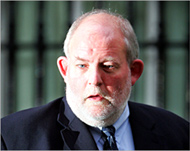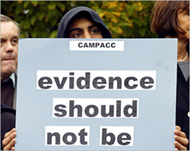Judicial blow to UK security strategy
British Prime Minister Tony Blair’ssecurity strategy looks to be in trouble after a landmark legal ruling against a vital part of his anti-terror policy.

The fate of 11 foreign “terror” suspects, held indefinitely without trial under draconian measures brought in after the September 11 attacks on the United States, is also unclear after Britain’s top court ruled the powers breached international law.
“All of the government’s terror legislation will come under greater scrutiny now,” Justin Fisher, head of politics at Britain’s Brunel University, said.
“It will force security a little bit on to the backburner – at least in the next six months before the election.”
On Thursday, Britain’s Law Lords ruled in favour of an appeal by nine of the 11 men held under an emergency anti-terror law rushed through in the wake of the 2001 attacks on the United States, saying it was discriminatory and excessive.
The law allows police to indefinitely detain foreigners suspected by Britain of involvement in terrorism, but crucially does not apply to British nationals.
Onus on parliament
The Lords’ verdict is not binding on Britain but puts the onus on parliament to amend the law so it conforms to the European Convention on Human Rights.
 |
|
Home Secretary Clarke said the |
One of the detainees, known only as “A”, welcomed the decision.
In a statement he said: “I am very pleased at this decision. It proves that, however erroneous the policies of the government are, there will always be an independent judiciary that will be there to say that enough is enough.
“This ruling should send a message to the legislators that national security can never take precedent over human rights.
“I hope now that the government will act upon this decision, scrap this illegal law and release me and the other internees to return to our families and loved ones.”
However, Home Secretary Charles Clarke is standing firmly by his refusal to release detainees from what rights’ activists describe as “Britain’s Guantanamo Bay”.
National security
Clark said, “My primary role as home secretary is to protect national security and to ensure the safety and security of this country … it is ultimately for parliament to decide whether and how we should amend the law …
“I will not be revoking the certificates or releasing the detainees, whom I have reason to believe are a significant threat to our security …
|
“I am very pleased at this decision. It proves that, however erroneous the policies of the government are, there will always be an independent judiciary that will be there to say that enough is enough” Statement by a detainee, known as “A” |
“[We will study the judgment to see whether anything can be done] to address the concerns raised by the House of Lords.”
Clarke was responding on his first full day as home secretary after taking over from David Blunkett, who had directed Britain’s tough anti-terrorism agenda.
Thursday’s verdict leaves the government with a difficult choice.
Releasing the inmates, who include Syrian cleric Abu Qatada – accused of being the spiritual inspiration for the main September 11 attacker – would give ammunition to Blair’s opponents.
Inadmissible evidence
However, amending the law to encompass British nationals would vex civil-rights groups.
 |
|
Civil-rights activists have called |
The other option of formally charging the men could prove too complicated.
Much of the evidence against them – including intelligence allegedly obtained by the United States using torture at the Guantanamo Bay prison camp – would be inadmissible in a British court.
Human-rights campaigners said the government had no option but to free the detainees.
“This ruling comes three years too late,” Amnesty International said in its immediate reaction to the judgement.
“Nothing can remedy the fact that people have been detained without charge or trial, principally on the basis of secret evidence, for nearly three years.”
Rachel Denber, of Human Rights Watch, said: “This leaves the government’s strategy in tatters. The Law Lords have reminded us of a self-evident truth – that no threat, however real, can justify abandoning basic principles of liberty and justice.”
Serious blow
Denber added: “The British government can no longer pretend that indefinite detention is compatible with its obligations under human rights law.
“Those detained indefinitely at Belmarsh and elsewhere should now be tried in the criminal courts or released.”
|
This ruling comes three years too late. Nothing can remedy the fact that people have been detained without charge or trial, principally on the basis of secret evidence, for nearly three years” Amnesty International |
Analysts said Thursday’s verdict was a serious blow to Blair’s security strategy – a major part of his bid for a third term at a general election expected next year.
Blair’s government is planning a raft of new security measures should it win the next election, including introducing identity cards and further beefing up existing anti-terror laws.
“This is a very major setback for the government strategy on these matters,” politics professor Wyn Grant said.
“Blair’s analysis is that other parties of the centre-left in Europe have been outflanked on the right on security issues and therefore he has always been very anxious to prevent that happening in the UK.”